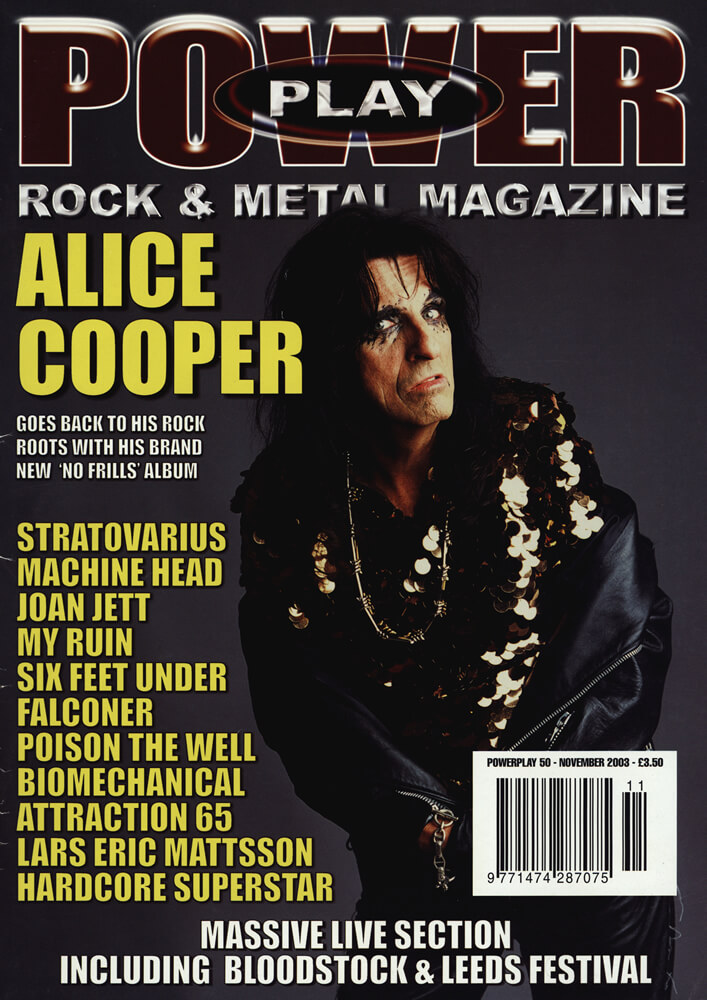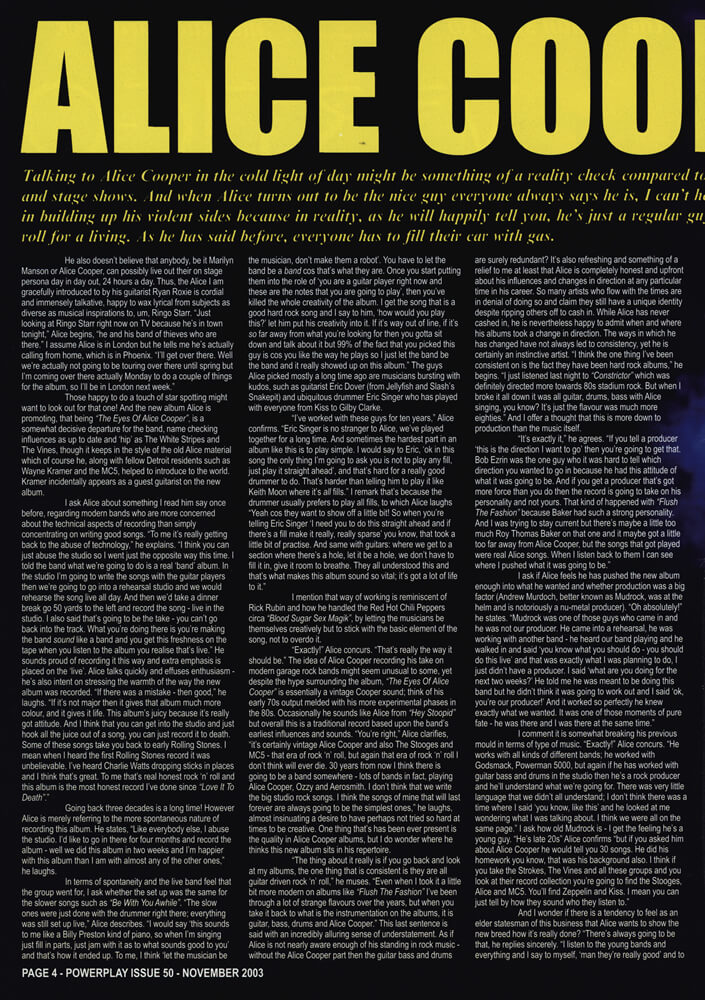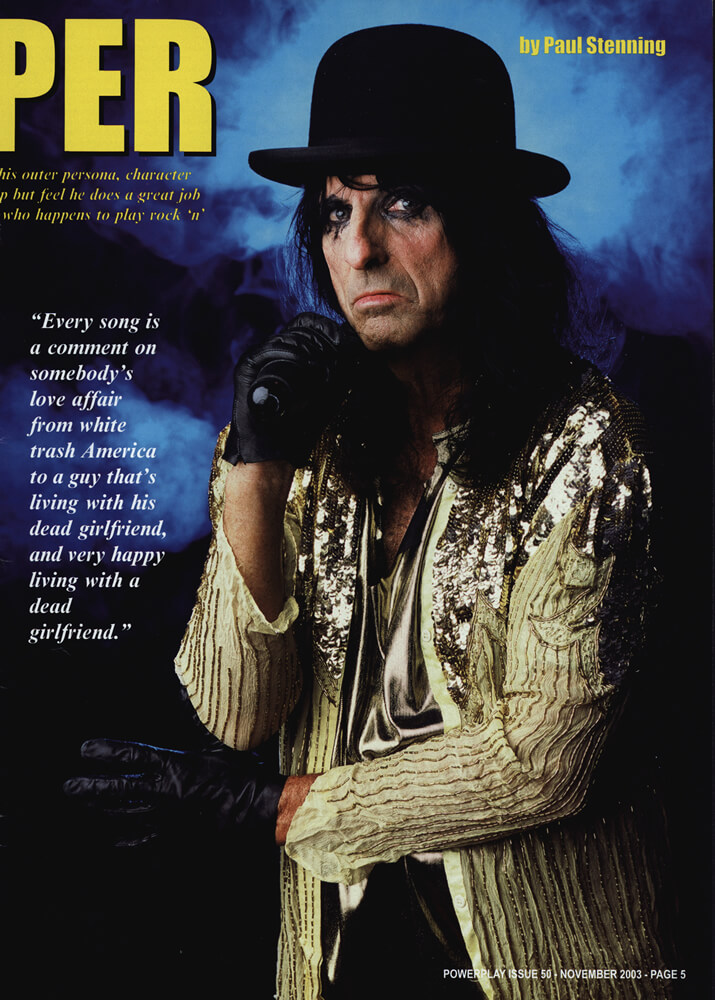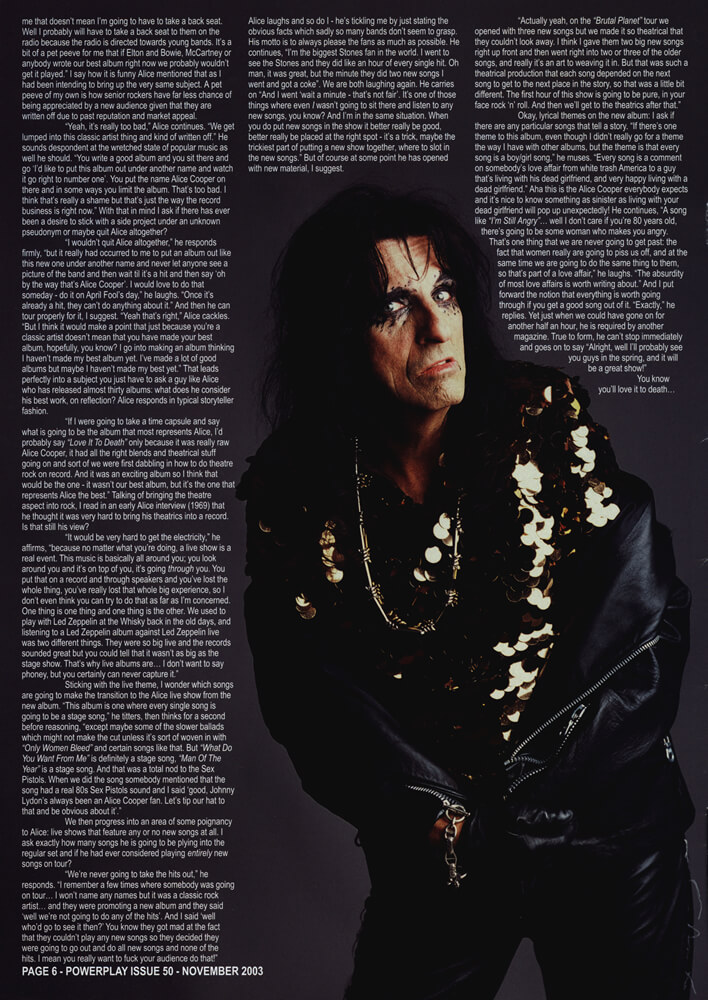Article Database
Alice Cooper
Talking to Alice Cooper in the cold light of day might be something of a reality check compared to hit outer persona, character and stage shows. And when Alice turns out to be the nice guy everyone always says he is, I can't help but feel he does a great job in building up his violent sides because in reality, as he will happily tell you, he's just a regular guy who happens to play rock 'n' roll for a living. As he has said before, everyone has to fill their car with gas.
He also doesn't believe that anybody, be it Marilyn Manson or Alice Cooper, can possibly live out their stage persona day in day out, 24 hours a day. Thus, the Alice I am gracefully introduced to by his guitarist Ryan Roxie is cordial and immensely talkative, happy to wax lyrical from subjects as diverse as musical inspirations to, um, Ringo Starr. "Just looking at Ringo Starr right now on TV because he's in town tonight," Alice begins, "he and his band of thieves who are there." I assume Alice is in London but he tells me he's actually calling from home, which is in Phoenix. "I'll get over there. Well we're actually not going to be touring over there until spring but I'm coming over there actually Monday to do a couple of things for the album, so I'll be in London next week."
Those happy to do a touch of star spotting might want to look out for that one! And the new album Alice is promoting, that being "The Eyes Of Alice Cooper", is a somewhat decisive departure for the band, name checking influences as up to tdat and 'hip' as The White Stripes and The Vines, though it keeps in the style of the old Alice material which of course he, along with fellow Detroit residents such as Wayne Kramer and the MC5, helped to introduce to the world. Kramer incidentally appears as a guest guitarist on the new album.
I ask Alice about something I read him say once before, regarding modern bands who are more concerned about the technical aspect of recording than simply concentrating on writing good songs. "To me it's really getting back to the abuse of technology," he explains. "I think you can just abuse the studio so I went just the opposite way this time. I told the band what we're going to do is a real 'band' album. In the studio I'm going to write the songs with the guitar players then we're going to go into a rehearsal studio and we would rehearse the song live all day. And then we'd take a dinner break, go 50 yards to the left and record the song - live in the studio. I also said that's going to be the take - you can't go back into the track. What you're doing there is you're making the band sound like a band and you get this freshness on the tape when you listen to the album you realise that's live." He sounds proud of recording it this way and extra emphasis is placed on the 'live'. Alice talks quickly and effuses enthusiasm - he's also intent on stressing the warmth of the way the new album was recorded. "If there was a mistake - then good," he laughs. "If it's not major then it gives that album much more colour, and it gives it life. This album's juicy because it's really got attitude. And I think that you can get into the studio and just hook all the juice out of a song, you can just record it to death. Some of these songs take you back to early Rolling Stones. I mean that I heard the first Rolling Stones record it was unbelievable. I've heard Charlie Watts dropping sticks in places and I think that's great. To me that's real honest rock 'n' roll and this album is the most honest record I've done since "Love It To Death"."
Going back three decades is a long time! However Alice is merely referring to the more spontaneous nature of recording this album. He states, "Like everybody else, I abuse the studio. I'd like to go in there for four months and record the album - well we did this album in two weeks and I'm happier with this album than I am with almost any of the other ones," he laughs.
In terms of spontaneity and the live band feel that the group went for, I ask whether the ste up was the same for the slower songs such as "Be With You Awhile". "The slow ones were just done with the drummer right there; everything was still set up live," Alice describes. "I would say 'this sounds to me like a Billy Preston kind of piano, so when I'm singing just fill in the parts, just jam with it as to what sounds good to you' and that's how it ended up. To me, I think 'let the musicians be the musicians, don't make them a robot'. You have to let the band be a band cos that's what they are. Once you start putting them into the role of 'you are a guitar player right now and these are the notes that you are going to play', then you've killed the whole creativity of the album. I get the song that is a good hard rock song and I say to him, 'how would you play this?' let him put his creativity into it. If it's way out of line, if it's so far away from what you're looking for then you gotta sit down and talk about it but 99% of the fact that you picked this guy is cos you like the way he plays so I just let the band be the band and it really showed up on this album." The guys Alice picked mostly a long time ago are musicians bursting with kudos, such as guitarist Eric Dover (from Jellyfish and Slash's Snakepit) and ubiquitous drummer Eric Singer who has played with everyone from Kiss to Gilby Clarke.
"I've worked with these guys for ten years," Alice confirms. "Eric Singer is no stranger to Alice, we've played together for a long time. And sometimes the hardest part in an album like this is to play simple. I would say to Eric, 'ok in this song the only thing I'm going to ask you is not to playany fill, just play it straight ahead', and that's hard for a really good drummer to do. That's harder than telling him to play it like Keith Moon where it's all fills." I remark that's because the drummer usually prefers to play all fills, to which Alice laughs "Yeah cos they want to show off a little bit! So when you're telling Eric Singer 'I need you to do this straight ahead and if there's a fill make it really, really sparse' you know, that took a little bit of practise. And same with the guitars: where we get to a section where there's a hole, let it be a hole, we don't' have to fill it in, give it room to breathe. They all understood this and that's what makes this album sound so vital; it's got a lot of life to it."
I mention that way of working is reminiscent of Rick Rubin an dhow he handles the Red Hot Chili Peppers circa "Blood Sugar Sex Magick", by letting the musicians be themselves creatively but to stick with the basic element of the song, not to overdo it.
"Exactly!" Alice concurs. "That's really the way it should be." The idea of Alice Cooper recording his take on modern garage rock bands might seem unusual to some, yet despite the hype surrounding the album, "The Eyes Of Alice Cooper" is essentially a vintage Cooper sound; think of his early 70s output melded with his more experimental phases in 80s. Occasionally he sounds like Alice from "Hey Stoopid" but overall this is a traditional record based upon the band's earliest influences and sounds. "You're right," Alice clarifies, "it's certain vintage Alice Cooper and also The Stooges and MC5 - that era of rock 'n' roll, but again that era of rock 'n' roll I don't think will ever die. 30 years from now I think there is going to be a band somewhere - lots of bands in fact, playing Alice Cooper, Ozzy and Aerosmith. I don't think that we write the big studio rock songs. I think the songs of mine that will last forever are always going to be the simple ones," he laughs, almost insinuating a desire to have perhaps not tried so hard at times to be creative. One thing that has been ever present is the quality in Alice Cooper albums, but I do wonder where he thinks this new album sits in his repertoire.
"The thing about it really is if you go back and look at my albums, the one thing that is consistent is they are all guitar driven rock 'n' roll," he muses. "Even when I took it a little bit more modern on albums like "Flush The Fashion" I've been through a lot of strange flavours over the years, but when you take it back to what is the instrumentation on the albums, it is guitar, bass, drums and Alice Cooper." This last sentence is said with an incredibly alluring sense of understatement. As if Alice is not nearly aware enough of his standing in rock music - without the Alice Cooper part then the guitar, bass and drums are surely redundant? It's also refreshing and something of a relief to me at least that Alice is completely honest and upfront about his influences and changes in direction at any particular time in his career. So many artists who flow with the times are in denial of doing so and claim they still have a unique identity despite ripping others off to cash in. While Alice has never cashed in, he is nevertheless happy to admit when and where his albums took a change in direction. The ways in which he has changed have not always led to consistency, yet he is certainly an instinctive artist. "I think the one thing I've been consistent on is the fact that they have been hard rock albums," he begins. "I just listened last night to "Constrictor" which was definitely directed more towards 80s stadium rock. BUt when I broke it all down it was all guitar, drums, bass with Alice singing, you know? It's just the flavour was much more eighties." And I offer a thought that this is more down to production than the music itself.
"It's exactly it," he agrees. "If you tell a producer 'this is the direction I want to go' then you're going to get that. Bob Ezrin was the one guy who it was hard to tell which direction you wanted to go in because he had this attitude of what it was going to be. And if you get a producer that's got more force than you do then the record is going to take on his personality and not yours. That kind of happened with "Flush The Fashion" because Baker had such a strong personality. And I was trying to stay current but there's maybe a little too much Roy Thomas Baker on that one and it maybe got a little too far away from Alice Cooper, but the songs that got played were real Alice songs. When I listen back to them I can see where I pushed what I was going to be."
I ask if Alice feels he has pushed the new album enough inot what he wanted and whether production was a big factor. (Andrew Murdoch, better known as Mudrock, was at the helm and is notoriously a nu-metal producer). "Oh absolutely!" he states. "Mudrock was one of those guys who came in and he was not our producer. He came into a rehearsal, he was working with another band - he heard our band playing and he walked in and said 'you know what you should do - you should do this live' and that was exactly what I was planning to do, I just didn't have a producer. I said 'what are you doing for the next two weeks?' He told me he was meant to be doing this band but he didn't think it was going to work out and I said 'ok, you're our producer!' And it worked so perfectly he knew exactly what we wanted. It was one of those moments of pure fate - he was there and I was there at the same time."
I comment it is somewhat breaking his previous mould in terms of type of music. "Exactly!" Alice concurs. "He works with all kinds of different bands; he worked with Godsmack, Powerman 5000, but again if he has worked with guitar, bass and drums in the studio then he's a rock producer and he'll understand what we're going for. There was very little language that we didn't all understand; I don't think there was a time where I said, 'you know, like this' and he looked at me wondering what I was talking about. I think we were all on the same page." I ask how old Mudrock is - I get the feeling he's a young guy. "He's late 20s," Alice confirms, "but if you asked him about Alice Cooper he would tell you 30 songs. He did his homework you know, that was his background also. I think if you take the Strokes, The Vines and all these groups and you look at their record collections you're going to find the Stooges, Alice and MC5. You'll find Zeppelin and Kiss. I mean you can just tell by how they sound who they listen to."
And I wonder if there's a tendency to feel as an elder statesman of this business that Alice wants to show the new breed how it's really done? "There's always going to be that," he replies sincerely. "I listen to the young bands and everything and I say to myself, 'man they're really good' and to me that doesn't mean I'm going to have to take a back seat. Well I probably will have to take a back seat to them on the radio because the radio is directed towards young bands. It's a bit of a pet peeve for me that if Elton and Bowie, McCartney or anybody wrote our best album right now we probably wouldn't get it played." I say how it is funny Alice mentioned that as I had been intending to bring up the very same subject. A pet peeve of my own is how senior rockers have far less chance of being appreciated by a new audience given that they are written off due to past reputation and market appeal.
"Yeah, it's really too bad," Alice continues. "We get lumped into this classic artist thing and kind of written off." He sounds despondent at the wretched state of popular music as well he should be. "You write a good album and you sit there and go 'I'd like to put this album out under another name and watch it go right to number one'. You put the name Alice Cooper on there and in some ways you limit the album. That's too bad. I think that's really a shame but that's just the way the record business is right now." With that in mind I ask if there has ever been a desire to stick with a side project under an unknown pseudonym or maybe quit Alice altogether?
"I wouldn't quit Alice altogether," he responds firmly, "but it really had occurred to me to put an album out like this new one under another name and never let anyone see a picture of the band and then wait til it's a hit and then say 'oh by the way that's Alice Cooper'. I would love to do that someday - do it on April Fool's day," he laughs. "Once it's already a hit, they can't do anything about it." And then he can tour properly for it, I suggest. "Yeah, that's right," Alice cackles. "But I think it would make a point that just because you're a classic artist doesn't mean that you have made your best album, hopefully, you know? I go into making an album thinking I haven't made my best album yet. I've made a lot of good albums but maybe I haven't made my best yet." That leads perfectly into a subject you have to ask a guy like Alice who has released almost thirty albums: what does he consider his best work, on reflection? Alice responds in typical storyteller fashion.
"If I were going to take a time capsule and say what is going to be the album that most represents Alice, I'd probably say "Love It To Death" only because it was really raw Alice Cooper, it had all the right blends and theatrical stuff going on and sort of we were first dabbling in how to do theatre rock on record. And it was an exciting album so I think that would be the one - it wasn't out best album, but it's the one that represents Alice the best." Talking of bringing the theatre aspect into rock, I read in an early Alice interview (1969) that he thought it was very hard to bring his theatrics into a record. Is that still his view?
"It would be very hard to get the electricity," he affirms, "because no matter what you're doing, a live show is a real event. This music is basically all around you; you look around you and it's on top of you, it's going through you. You put that on a record and through speakers and you've lost the whole thing, you've really lost that whole big experience, so I don't even think you can try and do that as far as I'm concerned. One thing is one thing and one thing is the other. We used to play with Led Zeppelin at the Whisky back in the old days, and listening to a Led Zeppelin album against Led Zeppelin live was two different things. They were so big live and the records sounded great but you could tell that it wasn't as big as the stage show. That's why live albums are.... I don't want to say phoney, but you certainly can never capture it."
Sticking with the live theme, I wonder which songs are going to make the transition to the Alice live show from the new album. "This album is one where every single song is going to be a stage song," he titters, then things for a second before reasoning, "except maybe some of the slower ballads which might not make the cut unless it's sort of woven in with "Only Women Bleed" and certain songs like that. But "What Do You Want From Me" is definitely a stage song, "Man Of The Year" is a stage song. And that was a total nod to the Sex Pistols. When we did the song somebody mentioned that the song had a real 80s Sex Pistols sound and I said 'good, Johnny Lydon's always been an Alice Cooper fan. Let's tip our hat to that and be obvious about it'."
We then progress into an area of some poignancy to Alice: live shows that feature any or nbo new songs at all. I ask exactly how many songs he is going to be playing into the regular set and if he had ever considered playing entirely new songs on tour?
"We're never going to take the hits out," he responds. "I remember a few times where somebody was going on tour... I won't name any names but it was a classic rock artist... and they were promoting a new album and they said 'well we're not going to do any of the hits'. And I said 'well who'd go to see it then?' You know they got mad at the fact that they couldn't play any new songs so they decided they were going to go out and do all new songs and none of the hits. I mean you really want to fuck you audience do that!" Alice laughs and so do I - he's tickling me by just stating the obvious facts which sadly so many bands don't seem to grasp. His motto is to always please the fans as much as possible. He continues, "I'm the biggest Stones fan in the world. I went to see the Stones and they did like an hour of every single hit. Oh man, it was great, but the minute they did two new songs I went and got a coke". We are both laughing again. He carries on "And I went 'wait a minute - that's not fair'. It's one of those things where even I wasn't going to sit there and listen to any new songs, you know? And I'm in the same situation. When you do put new songs in the show it better really be good, better really be placed at the right spot - it's a trick, maybe the trickiest part of putting a new show together, where to slot in the new songs." But of course at some point he has opened with new material, I suggest.
"Actually yeah, on the "Brutal Planet" tour we opened with three new songs but we made it so theatrical that they couldn't look away. I think I gave them two big new songs right up front and then went right into two or three of the older songs, and really it's an art to weaving it in. But that was such a theatrical production that each song depended on the next song to get to the next place in the story, so that was a little bit different. The first hour of this show is going to be pure, in your face rock 'n' roll. And then we'll get to the theatrics after that."
Okay, lyrical themes on the new album: I ask if there are any particular songs that tell a story. "If there's one theme to this album, even though I didn't really go for a theme the way I have with other albums, but the theme is that every song is a boy/girl song," he muses. "Every song is a comment on somebody's love affair from white trash America to a guy that's living with his dead girlfriend, and very happy living with a dead girlfriend." Aha this is the Alice Cooper everybody expects and it's nice to know that something as sinister as living with your dead girlfriend will pop up unexpectedly! He continues, "A song like "I'm Still Angry"... well I don't care if you're 80 years old, there's going to be some woman who makes you angry. That's the one thing that we are never going to get past: the fact that women really are going to piss us off, and at the same time we are going to do the same thing to them, so that's part of a love affair," he laughs. "The absurdity of most love affairs is worth writing about." And I put forward the notion that everything is worth going through if you get a good song out of it. "Exactly," he replies. Yet just when we could have gone on for another half an hour, he is required by another magazine. True to form, he can't stop immediately and goes on to say "Alright, well I'll probably see you guys in the spring, and it will be a great show!"
You know you'll love it to death...







